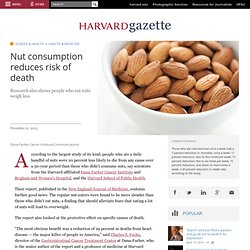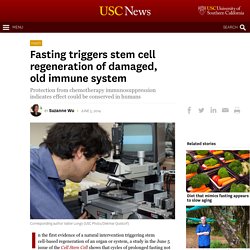

Helpful Chart For Anyone Who’d Like To Continue Living. Nut consumption reduces risk of death. According to the largest study of its kind, people who ate a daily handful of nuts were 20 percent less likely to die from any cause over a 30-year period than those who didn’t consume nuts, say scientists from the Harvard-affiliated Dana-Farber Cancer Institute and Brigham and Women’s Hospital, and the Harvard School of Public Health.

Their report, published in the New England Journal of Medicine, contains further good news: The regular nut-eaters were found to be more slender than those who didn’t eat nuts, a finding that should alleviate fears that eating a lot of nuts will lead to overweight. The report also looked at the protective effect on specific causes of death. “The most obvious benefit was a reduction of 29 percent in deaths from heart disease — the major killer of people in America,” said Charles S. Fuchs, director of the Gastrointestinal Cancer Treatment Center at Dana-Farber, who is the senior author of the report and a professor of medicine at Harvard Medical School. Fasting triggers stem cell regeneration of immune system.
In the first evidence of a natural intervention triggering stem cell-based regeneration of an organ or system, a study in the June 5 issue of the Cell Stem Cell shows that cycles of prolonged fasting not only protect against immune system damage — a major side effect of chemotherapy — but also induce immune system regeneration, shifting stem cells from a dormant state to a state of self-renewal.

In both mice and a Phase 1 human clinical trial involving patients receiving chemotherapy, long periods of not eating significantly lowered white blood cell counts. In mice, fasting cycles then “flipped a regenerative switch,” changing the signaling pathways for hematopoietic stem cells, which are responsible for the generation of blood and immune systems, the research showed. The study has major implications for healthier aging, in which immune system decline contributes to increased susceptibility to disease as people age.